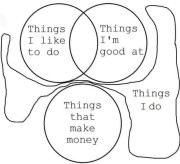|
Home
|
Jan 23, 2023
This week’s themeWords borrowed from other languages This week’s words ikigai chaebol cosh ombudsman toco 
Ikigai
Image: Wikimedia 
Ikigai 2.0
Image: Twitter Previous week’s theme Shoes A.Word.A.Day
with Anu GargReader Deborah Barber of Arlington, Virginia, wrote: “Last night I was explaining to my six-year-old that English is such a brilliant, expressive language because we borrow words from so many other languages. He replied, ‘I don’t think English borrows a word. I think the other language makes a copy of a word for us and keeps one for itself.’” That’s a great way to describe the lending and borrowing that takes place when languages meet. We make a copy. We can consider it an analog copy, say, a photocopy + an audio cassette copy. Copies are faithful, more or less, but each copy introduces subtle changes, in pronunciation, spelling, or meaning. Sometimes all three. English has a whole bunch of words from languages such as Latin, Greek, and French. This week we’ll feature words borrowed from some other languages, namely Japanese, Korean, Romani, Swedish, and Hindi. English has cast its net wide. If you speak English you know at least 100 different languages, small parts of them, because words from them have become a part of English. On a different note, have you found your ikigai? Share below or email us at words@wordsmith.org. Include your location (city, state). ikigai
PRONUNCIATION:
MEANING:
noun: 1. A sense of purpose or something that gives a sense of purpose; a reason for living. 2. Something that brings fulfillment or enjoyment. ETYMOLOGY:
From Japanese ikigai (a reason for being), from iki (life) + -gai
(worth). Earliest documented use: 1972. The French equivalent is
raison d’être.
USAGE:
“Have you found your ikigai? It’s never too late to start on a better path to living.” Harvey MacKay; Here’s a Design for Living; Arizona Republic (Phoenix); Oct 10, 2022. A THOUGHT FOR TODAY:
The shepherd always tries to persuade the sheep that their interests and
his own are the same. -Stendhal (Marie-Henri Beyle), novelist (23 Jan
1783-1842)
|
|
Subscriber Services
Awards | Stats | Links | Privacy Policy
Contribute | Advertise
Awards | Stats | Links | Privacy Policy
Contribute | Advertise
© 1994-2025 Wordsmith